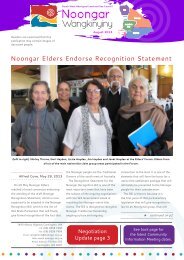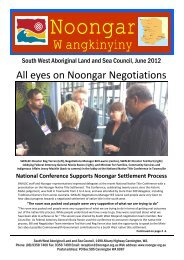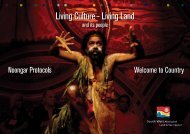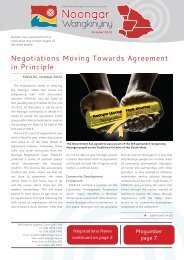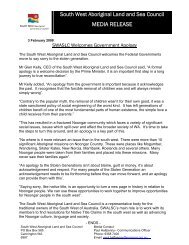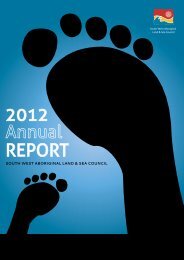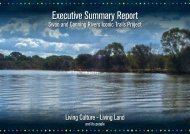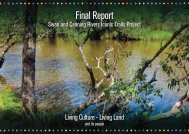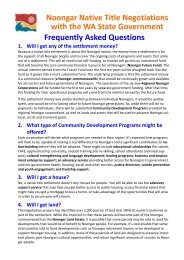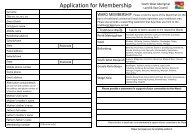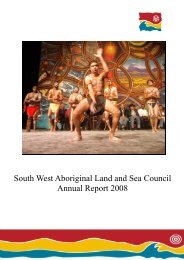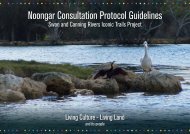Noongar News July 2010 - South West Aboriginal Land & Sea Council
Noongar News July 2010 - South West Aboriginal Land & Sea Council
Noongar News July 2010 - South West Aboriginal Land & Sea Council
- No tags were found...
Create successful ePaper yourself
Turn your PDF publications into a flip-book with our unique Google optimized e-Paper software.
<strong>Noongar</strong>Wangkinyiny<strong>South</strong> <strong>West</strong> <strong>Aboriginal</strong> <strong>Land</strong> and <strong>Sea</strong> <strong>Council</strong>, Makuru (<strong>July</strong>) <strong>2010</strong>Negotiations startThe negotiation process aimed at resolving the <strong>Noongar</strong> native title claims and achieving a broader land settlementover Perth and the south west of WA has started. The task facing the SWALSC negotiating team is to ensure thatthe outcomes offered to the <strong>Noongar</strong> people are capable of delivering very significant social, cultural, historicaland economic gains to the <strong>Noongar</strong> people before it could be recommended by the negotiation team to the claimgroups as the final decision makers. It would also have to address the historical legacy. The strength of the <strong>Noongar</strong>case in these negotiations will be based on all claims working closely together.A real opportunity to take a great stride towards making a much better futureWithout underestimating the difficulty of securing such a package, the negotiations present <strong>Noongar</strong>s with a realopportunity to take a great stride towards making a much better future. If successful, the negotiations could beexpected to be ready for finalisation by February 2012, and ready for implementation by December 2012. If thesenegotiations are unsuccessful, the parties would return to the federal court process, which may take 10 to 15years. Pages 4 to 15 of this newsletter are dedicated to providing background information about the negotiations.History of Single <strong>Noongar</strong> Claim wins research excellence prize(left) Chris Owen, SWALSC Research Manager, and KevinFitzgerald, SWALSC Cultural Counselor, were presented withthe prizeThe book telling the story of the Single <strong>Noongar</strong> Claimhas won the <strong>2010</strong> Margaret Medcalf Award for workthat showed excellence in using state archives. TheWA Minister for Culture and the Arts, Mr John Day,said at the award presentation on 19 May that “thejudges felt this book had the potential to alter the pathof historical <strong>Aboriginal</strong> research and that the work hasled to a paradigm shift in the way <strong>Aboriginal</strong> cultureand identity are defined and understood.”“a paradigm shift in the way<strong>Aboriginal</strong> identity is defined”In October 2009 SWALSC launched the book: "IT'SSTILL IN MY HEART, THIS IS MY COUNTRY" The Single<strong>Noongar</strong> Claim History, which is a history of the <strong>Noongar</strong>people and their survival. The book is based on thehistory report prepared by John Host and Chris Owenthat was tendered as expert evidence in the Single<strong>Noongar</strong> Claim. → Continued on page 3<strong>South</strong> <strong>West</strong> <strong>Aboriginal</strong> <strong>Land</strong> and <strong>Sea</strong> <strong>Council</strong>, phone: (08) 9358 7400, or 1800 617 617, fax: 9358 7499Email: reception1@noongar.org.au Web page: www.noongar.org.au Address: 1490 Albany Highway, Cannington WASWALSC— your Native Title Representative Body
Senior African journalists meet withSWALSC staff(left to right) Daniel Garlett, SWALSC Regional Development Manager, Carol Innes, SWALSC Policy and ProjectsManager, Khangale Makhado, Night <strong>News</strong> Editor of the Sowetan, from <strong>South</strong> Africa, James Mukanga, Chief SubEditor of the Sunday Vision, from Uganda, Gail Beck, SWALSC Regional Development Team Leader, ConstantineChimakure, Editor of the Zimbabwe Independent, Kelvin Lewis, Editor of Awoko, from Sierra Leone.Single <strong>Noongar</strong> Claim Book wins research excellence prize→ Continued from front pageThe book's title comes from the evidence of <strong>Noongar</strong> elder, Angus Wallam, sworn before the federalcourt. In this book, and in the original report to the court on which the book is based, SWALSC sought tochallenge existing versions of history and the related anthropology about <strong>Noongar</strong> people. Published byUniversity of WA Publishing, it is available from the UWA bookshop (rrp $39.95). SWALSC members canorder the book directly from SWALSC for $36 (include another $6 forpostage, total cost including postage is $42). For details call SWALSC on9358 7400 or send an email to: reception1@noongar.org.auDiane Carlyle from Campus Bookseller and Publisher said the book tellsthe story of the <strong>Noongar</strong> people’s native title claim over the south westand metropolitan Perth, and how “they adapted creatively to new realities—workingas guides and trackers, rural labourers, police and mailservice employees; fully acculturating the offspring of interracial unions,sending their children to school where the option existed—thefundamentals of their lifeways were retained, with individualsrecognised as ’cultural transmitters’ … reinforcing that whatever racialpurity‐obsessed anthropologists, caste conscious administrators,lawmakers or wider settler society did or thought, <strong>Noongar</strong>s activelysurvived, adapted and thrived”.“It’s Still in my heart, this is my country” is available to members from SWALSCat the discount rate of $36 (please include another $6 for postage).Contact SWALSC on (08) 9358 7400 or email: reception1@noongar.org.au3
Native Title Negotiation InformationWhat’s in the package and whyshould we pursue a settlement?A native title settlement is an out‐of‐court settlement that is reached when a package of outcomes is negotiatedto settle native title claims. These vary from region to region. In the case of the south west, themodel that is being proposed is to negotiate an extensivesettlement package in exchange for withdrawingthe <strong>Noongar</strong> native title claims.At first glance, this may seem like a fairly drasticaction, especially when you consider that inSWALSC’s view, <strong>Noongar</strong>s have a decent native titlecase to argue.The problem that we have in <strong>Noongar</strong> country is notwhether <strong>Noongar</strong>s can prove a native title case ornot, but what these rights actually amount to, andwhere these rights can actually be exercised. Giventhe widespread extinguishment, this is only a smallproportion of <strong>Noongar</strong> country.So when we think about these issues properly, itstarts to become fairly obvious that the type of settlementbeing proposed is a sensible course of actionthat has the potential to secure outcomes farbeyond what could be expected from a purely nativetitle outcome.More than native titleThe one very important point to think about here isthat the settlement being pursued is about muchmore than native title. Instead, it is about using thenative title claims as the legal vehicle through whichthe State of <strong>West</strong>ern Australia can settle native title,plus, come to terms with <strong>Noongar</strong> people to lay torest some of the burden of history that is left overfrom colonial and post‐colonial settlement.4Map showing the six <strong>Noongar</strong> native title claim areas, and(in black) Vacant Crown <strong>Land</strong> where native title rightsexist, (and in yellow) where native title rights have beenextinguished. The shaded area is State Forrest, where somenon‐exclusive native title access rights may still exist.It is an historic opportunity to finally come to terms with the State and to build a new futureSWALSC has been pursuing a strategy where the claims over the south west are put forward as one claimfrom the <strong>Noongar</strong> people, as a <strong>Noongar</strong> nation. Because of this strategy, we are now able to say to theGovernment: here are the claims of the <strong>Noongar</strong> nation of people, and here is your opportunity to cometo terms with the <strong>Noongar</strong> people, not just about native title, but about the burden and legacy of history.The State has accepted this challenge, and for this reason, the current negotiations are set to go well beyondthe narrow confines of native title and settling the native title claims; rather, they are native titleplus historic settlement.What if we did only deal with native title?While SWALSC thinks there is a decent native title case, the first thing to know about native title rights arethat they are what’s called a bundle of rights, that is, the right to do things like hunt, camp, ceremony,pass on culture and knowledge, and to take care of sites. These are all important, but they aren’t a landtenure – native title rights will never get our land back.Continued on next page →
Native Title Negotiation InformationContinued from previous page →The other thing about native title rights is that they can only be exercised on land where native title rightshave not been extinguished – and extinguish means exactly that, to put out, to switch off, or to endforever. This idea was established in the original Mabo case and says that, since settlement, governmentshave done a whole series of things to land, like let it go to farming, to reserves for National Parks, to createtowns and cities, and a whole variety of other things that extinguish, or end forever, native title rights.Extinguishment is the big issue that faces <strong>Noongar</strong> native title claims. Huge areas of land in <strong>Noongar</strong> countryhave been extinguished, so even if we won native title rights, there would be very little land wherethese rights could be exercised. In the rest, in areas like state forest, native title rights take second placewhenever they come into conflict with an existing land use (like logging for example).So, if we succeeded on native title terms we could celebrate for a while, but like other successful claims inAustralia, we would quickly realise, that in many respects, the victory was a hollow one.Is there an up-side to dealingonly with native title?Let’s say we did win in the native title court (which we believe is a fair chance), what would be the outcome?One of the most important things is recognition – remember how good we all felt when JusticeWilcox handed down his decision in 2006? That’s what you get from recognition, it is real and to <strong>Noongar</strong>sit is important and not negotiable.The other thing that may happen is compensation, but of course, there’s a catch. We are only able to receivecompensation for land extinguished after 1975 when the Racial Discrimination Act came in to force.We know that a lot of extinguishment happened before this, but we also know that there has been a lotsince this time, so there may be a good case for compensation at some point in the future.The problem here is that, if successful, it could take up to about 15 years to get through all the steps tothe end of a compensation claim.SWALSC does not think this is satisfactory. When these claims were lodged, they were lodged to getcountry back and to gain rights to our traditional lands. They were lodged to help <strong>Noongar</strong>s build a betterfuture, to give us the recognition that we could be proud of. They were lodged to try to resolve these issuesin our lifetimes, not in 15 years time, some 25 – 30 years after they were originally lodged.So while there is an up‐side to dealing only with native title, the marginal nature of the rights, and thevery long time frames more than nullify this. So there must be a better way.An historic opportunityThere is an opportunity, then, to resolve the native title claims and to also reach a historic agreement withthe State that allows, in some measure, for the State to come to terms with the <strong>Noongar</strong> people.SWALSC believes the best way to do this is to develop an alternative that dumps the negatives of the currentnative title system, like the long time frames, the complicated administration, and the very limitedareas of land on which an outcome can be exercised, and instead, to build on the positives of the systemand the strengths of our united claims.It is important that we work very hard to secure the essential core ‘bread and butter’ aspects of nativetitle, such as gaining proper recognition for <strong>Noongar</strong> people as traditional owners, and the securing of thebundle of access rights for things like hunting, fishing, caring for heritage places, ceremony and otherthings in state law.In addition, however, SWALSC believes it is important to secure compensation for the loss of native titleup‐front rather than in 15 years time down the track. SWALSC also believes it to be crucial to seek a measureof justice for the historical legacy that has been left to us.5Continued on next page →
Continued from previous page →Native Title Negotiation InformationWe strongly believe that the type of settlement that is being proposed can be used to build a land base(that is, to get land back), secure a joint management regime on national parks and beyond, improve theheritage regime, develop a system where <strong>Noongar</strong> people can benefit from the wealth that is derivedfrom <strong>Noongar</strong> land, deliver a <strong>Noongar</strong> wide governance system and secure an economic future throughassets and investment.This way, we can then invest in our culture and our community. We can secure the things that are importantto us and we can begin to tackle, on our terms, the things that matter to our community, things likecultural revitalisation, language teaching, scholarship and educational support, basic human welfare support,and business development. It will also help us to once again become strong people in our own country.So this settlement process is about a lot more than native title. It is in fact a once in a lifetime opportunityfor <strong>Noongar</strong> people to build the future that we have been talking about for a long time. And thetime is now.A <strong>Noongar</strong> Vision for a <strong>Noongar</strong> FutureA settlement of the <strong>Noongar</strong> native title claims is a platform to build a better future. It’s not just aboutnative title, its about building a platform for <strong>Noongar</strong> people to attain the vision for the future that wehave set ourselves.But what is the vision for a <strong>Noongar</strong> future? In early <strong>2010</strong>, SWALSC convened a <strong>Noongar</strong> Dialogue andasked this very question. In answering, the participants acknowledged the work of Mr Len Collard, whodevised the ‘<strong>Noongar</strong> Trilogy of Being’ – that is, that the future of <strong>Noongar</strong> people is grounded in the ancient<strong>Noongar</strong> concepts of Budjar – reconnection with, authority and control over traditional lands, Katitjin– <strong>Noongar</strong> ways of knowing, doing, teaching and being, and Moort – our people, the law and spirit thatbinds.The <strong>Noongar</strong> Dialogue brought together a wide range of <strong>Noongar</strong> perspectivesThe <strong>Noongar</strong> Dialoguereport can be viewedon‐line at the SWALSCweb page at:www.noongar.org.auFrom these ideas, participants in the Dialogue described what a <strong>Noongar</strong> futuremight look like, and that it is a future in which <strong>Noongar</strong> people are respected, areculturally secure, have ownership and control of lands, are self sustained, have opportunity,are united as a people, are healthy, are well educated, and who are leadersin our own land and in our own lives.Mr Bill Bennell Jnr penned a vision which captures these ideas in an evocative way:“We want to walk in our country as our ancestors did, to look with our eyes, to tasteour culture, to listen to our language, to smell our heritage, to touch the truth in ourhearts and use this power to create our destiny as <strong>Noongar</strong> people.”Continued on next page →6
Continued from previous page →Native Title Negotiation InformationThis is the vision that drives the efforts of SWALSC in seeking to reach an agreement with the State, andessentially, what SWALSC is doing is seeking to build a platform so that we can invest in our people andour culture so that we can attain this vision. Across the world and within Australia, Indigenous peopleshave used native title and similar settlements to build themselves a platform from which to create thefuture they aspire to.Alaska, New Zealand, and the Larrakia examplesOne example that we have been using is that of Alaska, where native title was settled in 1973. The settlementof land and monies was used to develop good governance structures, invest in business to have aconstant income stream and employment, but perhaps most importantly, to invest in people, culture,education, health, housing, language and other things.Some 40 years later they have a culturally intact community that is well educated, healthy, strong andwho are the masters of their own destiny. Please view www.sealaska.com and www.sealaskaheritage.orgto see what can be achieved out of native title settlement.In New Zealand, treaty settlements have achieved similar ends. Treaty settlements have been used to securerights, lands and funds which are invested in business and in people and culture. Many <strong>Noongar</strong>s areaware of the strong language revival that has happened in New Zealand from the investment that has occurredfrom treaty settlement. <strong>Noongar</strong>s are probably less aware that various Maori people have commercialinvestments in and around Perth and the south west, and all over the world for that matter.The Maori people use the dividends from these investments as an income streamfor their communities, and are fast becoming the masters of their own destiny.Closer to home, the Larrakia people established a development corporation through which to do businessand which states its vision as to aim “to promote the financial independence and lifestyle of all Larrakiapeople through the commercial development of Larrakia assets, and to do so in such a way that promotesemployment, training and business opportunities for all Larrakia people.”While the Larrakia Development Corporation was set up prior to any major advances in native title settlement,it has been able to take advantage of forms of native title settlement since then to develop land in acommercial way to create a flow of capital for the Larrakia people, and a variety of employment options.To learn more about the Larrakia Development Corporation please view www.larrakia.com.au.These are the outcomes that SWALSC aspires to, and to which <strong>Noongar</strong> people clearly also aspire.This is why SWALSC is seeking to reach agreement, and as others have shown, it is a very worthy goal.Governance IssuesPerhaps the most difficult part of the agreement making process for <strong>Noongar</strong> people will be the developmentof a <strong>Noongar</strong> wide system of governance; perhaps because, while for decades we have all talkedabout what should happen, there hasn’t been much talk about how it should be managed.If we are successful in reaching an agreement, a whole raft of very significantresponsibilities will be landed upon <strong>Noongar</strong> people, and we need to be able tomanage these responsibilities.In addition, if our strength is as a <strong>Noongar</strong> people, then the system of governance that is developed needsto continue being about <strong>Noongar</strong>s – the last thing we need is for regional groups to compete with and undermineeach other, we need a system which builds on our strengths, and that is, as a <strong>Noongar</strong> people.There are a number of things that are clear though, we need a system of governance in which the regionscan do their business about their country at one level, and through which <strong>Noongar</strong>s can come together totalk about issues that are of importance to all <strong>Noongar</strong>s on another level.Continued on next page →7
Continued from previous page →Native Title Negotiation InformationFor this reason, it has been proposed to develop a hub and spoke governance system which delivers realindependence to the regions while ensuring we move forward as a <strong>Noongar</strong> nation.In this hub and spoke model it is proposed to develop six regional corporations, in line with what is requiredfrom a native title claim settlement, as well as to maintain an all of <strong>Noongar</strong> organisation to provideassistance and maintain an all of <strong>Noongar</strong> function.What might a future ‘Hub and Spoke’<strong>Noongar</strong> organisational structure look like?Regional<strong>Noongar</strong>AgencyRegional<strong>Noongar</strong>AgencyCentral<strong>Noongar</strong>AgencyRegional<strong>Noongar</strong>AgencyRegional<strong>Noongar</strong>AgencyRegional<strong>Noongar</strong>AgencyRegional<strong>Noongar</strong>AgencyThe regional corporations will be a key piece of infrastructure in that they will provide the <strong>Noongar</strong> peoplein the regions with the facility to make decisions over their own country. In addition, these organisationswill be a central hub for <strong>Noongar</strong> affairs in their respective regions.The regional organisations will have a very important role. They will be the site in which outcomes stemmingfrom the agreement are situated and where decisions about country are made. The regional corporationswill be responsible for overseeing and managing such things as the joint management of nationalparks, heritage protocols, processes surrounding land use, land access arrangements, access to naturalresource arrangements, cultural initiatives and programmes, community development initiatives, and previousfuture act agreements.The central organisation, on the other hand, has quite a different role. One of its main functions will involvesupporting the regional organisations in the start up, and throughout the operational phase. Also itwill play a support role for cross‐<strong>Noongar</strong> coordination, that is, to ensure that we have consistency across<strong>Noongar</strong> country in the way the results of a settlement are implemented and developed.8Continued on next page →
Continued from previous page →Native Title Negotiation InformationThe third main role for the central organisation will be about people and culture, that is, developing andimplementing the programs through which people and culture are invested in and supported. In otherwords, the central organisation will have a prime role in the implementation of the community developmentaspects of the settlement, as well as investing in culture in the interests of all <strong>Noongar</strong> people.While there is some distance to travel before these arrangements are put into place, the basic principlethat we need to progress along is clear – ensure the regions have the ability to make decisions about theircountry and ensure we maintain the ability to always move ahead as a <strong>Noongar</strong> people.What would be the main roles of thecentral and regional <strong>Noongar</strong> agencies?Central <strong>Noongar</strong> Agency Role• Provision of corporate support and adviceto regional bodies corporate, includinglegal, accounting, financial, landmanagement, and research.• Provide all of <strong>Noongar</strong> coordination to ensureconsistency across <strong>Noongar</strong> country &maintain our strength as a <strong>Noongar</strong> people.• Developing and administering regionalfinancial support programs and projects.• Management of <strong>Noongar</strong> research andresource archives, and <strong>Noongar</strong> languageand culture programs.• Administration of cultural and socialprograms.• Administration of some scholarship funds.Regional <strong>Noongar</strong> Agency Role• Management of the regional land base(cultural and economic values, local<strong>Aboriginal</strong> <strong>Land</strong> Trust, & other assets).• Administration of joint managementarrangements.• Administration of pre‐existing Future Actagreements.• Administration of Heritage protocols.• Management of regionally based initiatives,such as community developmentprograms and scholarship funds.• Management of the local regional centre.• Management of traditional ownerdecision making process.What items are listed for negotiation?The items listed for negotiation include recognition of traditional ownership, a culturally, socially, and economicallyvaluable land base, a heritage regime that better protects culture, joint management of protectedareas, rights of access to land for traditional purposes, a community development package directly addressingthe health, housing, educational, and welfare priorities, and an ongoing revenue stream that supportsthese outcomes in a sustainable way. If an adequate package was successfully negotiated, it would have thecapacity to have a very positive impact on the economic and social standing of the <strong>Noongar</strong> people, and intheir relations with the wider community. More importantly, it would have the potential to partially addresssome very big problems. While there is widespread respect and genuine support from many people in thewider community for <strong>Noongar</strong> culture, reflected in the constantly increasing interest in <strong>Noongar</strong> history,stories, art, dance, and music ; now is the time for formal acknowledgement of the <strong>Noongar</strong> people as traditionalowners of the south west of <strong>West</strong>ern Australia.What’s the story on compensation?Under the Native Title Act, compensation is only payable on native title extinguished since 1975 and between1975 and 1992. Most of the native title on <strong>Noongar</strong> land was extinguished before 1975.9Continued on next page →
Comparing a negotiated and a court based settlementNegotiated settlementGood chance of success.If unsuccessful, back to court process.Timeframe of 2‐3 years.Recognition of traditional ownership in State law.Native Title Negotiation InformationCourt based settlementUncertain chance of success and contested all the wayby governments and respondents.If unsuccessful, it’s all over, forever.Timeframe: Establish connection through the courts:5 years; examine extinguishment: 4 to 5 years, compensationclaim: 4 to 5 years. Total: 10 to 15 years.Recognition of traditional ownership in Federal law.Recognised ability to access far greater amounts ofcrown land through ignoring extinguishment forhunting, fishing, camping, taking care of sites, passingon cultural information etc.Development of a settlement package.Compensation calculated and paid in lieu in thevalue of a settlement package.As above.Potential to provide a measure of reconciliation forlegacy of past government acts throughvaluing past acts of the crown in a package.Ability to develop a <strong>Noongar</strong> land base forcultural, social and economic purposes.Development of a sustainable economic base.Joint management of national parks.Revised heritage regime to improve heritagemanagement.<strong>Land</strong> use activity regime for maintaining somerights in relation to big projects.Community development package.Development of sustainable and resourcedsystem of governance for all <strong>Noongar</strong> country.Equity across all <strong>Noongar</strong> people.Ability to resource maintenance of languageand culture.Ability to generate self sufficiency.Generation of <strong>Noongar</strong> commonwealth.Recognised ability to access very limited areas ofcrown land where native title has survived forhunting, fishing, camping, taking care of sites, passingon cultural information etc.No settlement package, just a court order forrecognition of traditional ownershipNo potential for compensation for landsextinguished before 1975.Potential for compensation for loss of native titlerights post 1975. 15 year time frame and subject tosuccessful court outcome.No potential for provision of a measure ofreconciliation.No ability to generate a land base.No economic base.No joint management of national parks and no nativetitle rights in national parks due to extinguishment.No potential to revise heritage regime.If successful, future act rights on lands thathave not been extinguished.No community development package.Development of disparate and unfundedprescribed bodies corporate.Some claims groups do well, some have almost nooutcome due to extinguishment.No ability to resource maintenance of languageand culture.No ability to be self sufficient.No change from current day situation.10
Native Title Negotiation InformationWhat land should be included in the package?As part of the process of attempting to resolve the <strong>Noongar</strong> native title claims over Perth and the southwest, SWALSC is asking members to identify areas of land that they would like to see included in the settlementpackage. These areas may be of historical, cultural, traditional, or economic significance. Thenegotiations are seen as possibly the best opportunity that <strong>Noongar</strong> people will have of “getting their landback”. While the map included in this newsletter on page 4 shows how little vacant crown land (wherenative title rights have not yet been extinguished) still exists, SWALSC believes it is crucial for members toidentify specific areas of land that they believe should be included in the negotiations. Submissions identifyingsuch areas of land should be sent to SWALSC, marked for the attention of Stuart Bradfield, andshould include the following information: name of land (eg Walyunga NP), claim area (eg Metro), type(cultural, social, commercial), Australian map grid reference (if known), other reference (eg reserve number),road name, contact (eg source of information), and any comments.National Native Title Tribunal sets up south west web pageThe National Native Tribunal has set up a section on their web page aimed at providing information aboutthe progress of the <strong>Noongar</strong> native title claim negotiations. To visit the Native Title Tribunal page, go tothe SWALSC web site at www.noongar.org.au and click the link , or visit the Tribunal page directly andlook for the link to: ”<strong>West</strong>ern Australia—<strong>South</strong> <strong>West</strong> Region”.What principles should apply to analternative settlement?SWALSC is not wedded to a narrow native title outcome, and has aclear vision of the kind of settlement that is needed, and the keyprinciples that should inform it.The settlement should:• acknowledge the past and serve the future;• be just and capable of being recognised as just;• provide equitable benefit and recognition for all <strong>Noongar</strong> people;• support <strong>Noongar</strong> culture;• be sustainable in the long term in respect of economics,governance, structures, and social and environmental impacts.Also, the settlement should not:• be an alternative form of passive welfare;• be unsustainable or too complex;• seek to replace rather than augment existing govt programs;• lead to ongoing legal problems;• position <strong>Noongar</strong> people in opposition to each other for all time.Consequently, the settlement should:• resolve fully all legal issues;• be proportionate to the historic significance of the settlement;• provide a say for <strong>Noongar</strong>s in their country;• provide land which belongs to <strong>Noongar</strong>s;• generate positive intergenerational effects;• have balanced and effective governance;• promote common wealth; and• encourage individual effort.11Sources ofInspirationTwo inspiring examples oftraditional owners makinga success of native titlesettlements are providedby the Larrakia DevelopmentCorporation from theNorthern Territory.See their web page at:www.larrakia.com.au.Another example is thetraditional owners ofAlaska who ultimatelymade a great success oftheir native title settlementthrough smart investmentand ownership of a solidrange ofbusinesses, which feedprofits into communitydevelopment projects,strengthening their cultureand heritage through theAlaska Native ClaimSettlement Act 1972.See their web pages at:www.sealaska.comandwww.sealaskaheritage.org
Native Title Negotiation InformationNative title agreementcrucial for real changeThe State Government and the <strong>South</strong> <strong>West</strong> <strong>Aboriginal</strong> <strong>Land</strong> and <strong>Sea</strong> <strong>Council</strong> haveagreed on a framework to negotiate the settlement of a native title claim over Perthand the south west. Glen Kelly says it could mark a new chapter in reconciliationPublished in the <strong>West</strong> Australian on 31 December 200912When native title arrivedin WA it inspired fearand loathing in governmentsand commentators.Some were just plain offendedby the idea of giving recognition tothe fact that <strong>Aboriginal</strong> people livedhere long before sovereignty wasassumed over WA on 11 June 1829.Some fears were entirely pragmatic,a new set of rights threatened thesmooth running of a pioneeringeconomy built on free access to landfor farming and mineral extraction.Years on, <strong>West</strong> Australians knowthat native title claims can be settledwithout the sky falling in.Arguments continue about the degreeto which claim settlements improvematerial conditions. In part,these discussions miss the point; nativetitle is not a grant from a generousgovernment but a belated recognitionof pre-existing rights. However, fewwould disagree that with <strong>Aboriginal</strong>affairs still in a state of daily tragedy,every step must be taken to turn nativetitle claim settlement into a force forpractical advancement, as well as symbolicand legal resolution.It is well known that the native titlelaws are flawed. The vast majority ofthe native title in Nyoongar country isextinguished by freehold and othergrants of tenure. Despite this, the<strong>South</strong> <strong>West</strong> <strong>Aboriginal</strong> <strong>Land</strong> and <strong>Sea</strong><strong>Council</strong>, representing about 30,000Nyoongars, has continued to pursuethe process. Why? Because native titleremains the only platform from whichNyoongar people can aspire to a dignifiedrecognition of their culture, ameasure of self direction, land, influenceand social justice.All previous government attempts todeliver a legal knockout blow failed.Why? Because actually, there is a decentnative title case to be argued.There is also an important matter ofprinciple to be settled, and complex,expensive, acrimonious and protractednative title litigation will continue inthe south west unless a negotiated solutionis found. But to resolve the settlementblow by (a very expensive)legal blow would be a waste of resources,time, goodwill and humanpotential on all sides. Failure to reachagreement will reinforce deepeningdivision and distrust between Nyoongarpeople and the broader society.While native title is not the answer, ithas provided the exhaustive researchwhich has allowed us to identify people,illuminate the culture and buildincreasingly robust and effective communityrepresentative structures thatfor the first time have a cultural legitimacyand logic to them. While imperfect,these structures work by allowingownership of the solution to be sharedwith the community. And they arealready being used to build genuinepartnerships aimed at closing the gapon Nyoongar disadvantage and a pathto prosperity and opportunity. On thedownside, native title is complex, adversarial,inefficient in translating inputs(rights and human resources) intooutputs (community aspirations), andinequitable in distribution of outcomesacross the Nyoongar community. It isalso true that there are people in theNyoongar community who need torealise the world has moved on, andthat this is an opportunity to make adifference, rather than a ticket to ride.SWALSC, which representsNyoongars in these matters, stronglybelieves an alternative which builds onthe positives of the current systemand dumps the negatives can beachieved. So what is required? A substantial,not token, form of recognitionfor Nyoongar culture is important andserves a practical purpose in that itlays to rest the burden of the past andenables Nyoongars to focus wholly onthe future. Equally, important are thepractical mechanisms, structures, programs,goals and resources throughwhich the future is made. SWALSChas a clear vision for aprincipled and practical settlementthat should acknowledge the pastand serve the future; be just; provideequitable recognition andbenefit across all Nyoongar people;and be sustainable in the long termwith regard to economics, governance,structures, and social andenvironmental impacts.A settlement should notamount to an alternative formof passive welfare; be unsustainableor unnecessarily complex;duplicate rather than augmentexisting programs; undermineNyoongar culture; or positionNyoongar people in oppositionto other parties for alltime.Asettlement should: be finalproportionate to the historicsignificance; be clearly justin the eyes of any reasonableperson; provide a say for Nyoongarsin their country, a strategic direction,a land base and an economicplatform; invest in education, culture,health, self esteem, skills, spiritualdevelopment, and hope; combine theefforts and expertise of Commonwealth,State and <strong>Aboriginal</strong> and non-<strong>Aboriginal</strong> community organisationstowards these common goals; promotereal — not venal — leadership,and awareness of rights and responsibilities;focus on the future — kids;promote a common wealth and encourageeffort.SWALSC has a view about howsettlements can be structured so thatthe outcomes satisfy these principles.A settlement is a substantial and lastinginvestment in a common future. Itis not a quick fix. It is a mark of maturity.By signing this month's headsof agreement regarding the native titleclaim over Perth and the <strong>South</strong>-<strong>West</strong>,the State Government has, to itscredit, opened the door to a negotiatedsettlement which embraces theseprinciples. The question is: can we alluse this opportunity to write a newpage?Glen Kelly is chief executiveof the <strong>South</strong> <strong>West</strong> <strong>Aboriginal</strong><strong>Land</strong> and <strong>Sea</strong> <strong>Council</strong>
Native Title Negotiation InformationNyoongarnative titleLetter to the EditorYour recent reports have revealed an emerging inequityin the native title process ($3 billion for secret trusts ascommunities rot, 22/3).It shouldn't come as any surprise that details ofagreements aren't made public — they containcommercial in-confidence information of miningoperations and, in the main, the mining industry isresolute in its position that these details are not madepublic.Nor should it come as any surprise that the trust deedsand accounts are kept private. They are an asset derivedfrom a commercial negotiation to compensate for theloss of property rights and no other Australian isrequired to advertise similar assets or is compelled toreveal how they spend their compensation.But arguments about inequity and proper use of thesefunds have a ring of truth about them. Meanwhile, thereis nothing inherently wrong with using native titlemoney to leverage or augment existing governmentprograms.While the native title system should not be an excuse forgovernments to avoid their responsibilities, it isSWALSC's position that most of the payments andassets derived from Nyoongar native title negotiationsshould be applied towards Nyoongar communitydevelopment and should be used to address specificneeds across Nyoongar country, such as support for theaged, education and training scholarships for youngsters,improved health and housing services and,importantly, support for Nyoongar employment,economic development, enterprise and business.Our council believes any benefits derived from Nyoongarnative title should be shared equitably by all Nyoongarpeople and we hold this view because our aim is toachieve a form of justice for the historical legacy thatresulted from European settlement on Nyoongar landthat gives proper recognition to the traditional owners,that draws inspiration from other successful native titleclaims and which has the capacity to build on thestrengths and cultural integrity of the Nyoongar peopletowards a culturally strong, well-educated, well organisedcommunity that can attain financial independenceand a much better future.We want to see more Nyoongar people who are strongand confident in their culture and at the same time thrivingmembers of the WA community. You don't get thatby waiting for governments to fix everything.The SWALSC will soon start negotiation of an alternativenative title settlement with the WA Government onbehalf of the 30,000 <strong>Noongar</strong> people relating to 200,000square kilometres in the south west. SWALSC is nowconducting an extensive series of information and consultationmeetings across Nyoongar country where wewill be providing background briefings to Nyoongarpeople about the negotiations with the WA Government.Glen Kelly, CEO, <strong>South</strong> <strong>West</strong> <strong>Aboriginal</strong> <strong>Land</strong> and <strong>Sea</strong> <strong>Council</strong><strong>Land</strong>mark nativetitle solution mootedThe Nyoongar people are in talksthat could result in a jobs andland packageDEBBIE GUESTWEST Australian Aboriginesinvolved in a decadelongland dispute coveringPerth and the southwest ofthe state may relinquishnative title in favour of agroundbreaking settlementpackage including land andjobs.If landmark negotiationsbetween the Nyoongar peopleand the Barnett governmentare successful, theagreement could becomeAustralia's first alternativenative title settlement.Under a new deal signedwith the <strong>South</strong> <strong>West</strong> <strong>Aboriginal</strong><strong>Land</strong> and <strong>Sea</strong> <strong>Council</strong>,the government willnegotiate another form ofland ownership recognition,such as an Indigenous <strong>Land</strong>Use Agreement. A settlementpackage offering arange of benefits will alsobe negotiated.The package could includenative health and educationpro-grams designedto complement existingmainstream services. Itcould also require governmentdepartments to operatenational parks in partnershipwith Aborigines and createtraining and job opportunities.If agreement is reached,all current and future nativetitle claims would be resolved.The battle for native titleby the Nyoongar peoplebegan a decade ago, resultingin endless litigation. In2006, Federal Court judgeMurray Wilcox found nativetitle existed over Perth butthe then Labor state governmentappealed and recognitionwas overturned. Sincethen, the Single Nyoongarclaim, which covers , theentire southwest, and severalsmaller claims havebeen progressing throughthe Federal Court at a slowpace.SWALSC negotiationmanager Bill Lawrie saidnegotiations would beginsoon, following the signingof a heads of agreementbetween the council andgovernment. "The processis to explore whether wecan exchange complicated,complex native title rightsfor another form of recognitionand an agreementpackage which acknowledgesthe past and servesthe future," he said."It's a recognition that alitigated outcome takes thecontrol out of the partiesand that by working togetherand attempting toreach a mutually satisfactoryagreement, it's likely tobe a better outcome than alitigated outcome."Mr Lawrie said the30,000 Nyoongar peoplethe council representedhoped the agreement wouldaddress disadvantage.However, he said it wastoo early to say how mucha settlement package couldcost<strong>West</strong> Australian AttorneyGeneral Christian Portersaid the package wouldbe the final settlement tothe native title claims."The Nyoongar peoplewill receive their due recognitionas the traditional ownersof this land, and the developmentin the Perth metropolitanarea and the southwestwill proceed unimpededby complex andlengthy native title processes,"he said.No alternative native titlesettlement of the type proposedfor the southwest hasbeen achieved in Australia.Published in the <strong>West</strong> Australian 30/3/<strong>2010</strong>Published in The Australian on 8 January <strong>2010</strong>13
Native Title Negotiation InformationFrequently Asked QuestionsWhy should <strong>Noongar</strong>s support the negotiation process?The process has the potential to deliver much better outcomes, more quickly, than a court based settlement;and there are at least 7 reasons to support the negotiation process: including (1) recognition of traditionalownership, (2) a valuable land base, (3) a better heritage regime, (4) joint management of protectedareas, (5) rights of access to land for traditional purposes, (6) a community development packageaddressing <strong>Noongar</strong> health, housing, educational, and welfare priorities, and (7) an ongoing revenuestream that supports these outcomes in a sustainable way.Who will benefit from a successful negotiation?All <strong>Noongar</strong>s will benefit. Unlike many other native title agreements, this agreement is based on the firmprinciple of equity for all <strong>Noongar</strong>s.Will any members of the negotiating team receive any direct benefit from the agreement?No. Those involved in the negotiations will not receive any benefit from the negotiations. In fact, all membersof the negotiation team are volunteers.How long will the negotiations take to complete?The negotiations are expected to take about two years, and could be ready for finalisation by February2012, and ready for implementation by December 2012.What happens if the negotiations fail?If the negotiations are unsuccessful, the parties would simply return to the federal court process, whichmay take anything between 10 and 15 years to complete.What happens to the <strong>Land</strong> <strong>Council</strong> if the negotiations are successful?As the main reason for its existence (settlement of the <strong>Noongar</strong> native title claims) would have beenachieved, the <strong>Land</strong> <strong>Council</strong> will need to undertake major reform so it can take up duties as the ‘Central<strong>Noongar</strong> Agency’. This is important as it is needed to provide corporate support to the six new ’Regional<strong>Noongar</strong> Agencies’, and to begin cultural programs which use the massive cultural resources it has gatheredover the past 20 years.What happens to the claim groups if the negotiations are successful?The six claim groups would be replaced by the six new ’Regional Agencies’, who would have carriage ofbusiness previously undertaken by the claim groups.Who gets to make the final decision about accepting or rejecting an agreement with the Government?The members of each of the six claim groups will make the decision on whether to accept or reject anyoffer of settlement of their respective native title claims.What happens to ’Future Act’ matters if the negotiations are successful?It is expected that significant future act items will be referred to the relevant “Regional Agency” for decisions,while the less significant items may be dealt with administratively.Is this the best chance of getting some land back?Yes. The <strong>Land</strong> <strong>Council</strong> firmly believes that the nature of the native title legislation, and specifically thewidespread extinguishment of vacant crown land (and therefore the extinguishment of native title rights)across the south west and metropolitan regions before 1975, means that there would be very little landleft that would be subject to native title rights or compensation after completion of the 10 to 15 yearsthat it might take to finalise the <strong>Noongar</strong> native title claims through the federal court. We believe that thenegotiations offer the best chance of getting any decent amount of land back.What kind of programs are expected to result from a successful negotiation?Priority programs might include initiatives such as education and training scholarships for the young,housing maintenance for the elderly, housing deposit help for first home buyers, health assistance andgeneral welfare support . If you have any suggestions about what types of programs should be provided,subsequent to a successful negotiation, please send them in to the <strong>Land</strong> <strong>Council</strong>.Continued on next page →14
Native Title Negotiation InformationFrequently Asked Questions continued from previous page →What is the process?In the end, the <strong>Noongar</strong> people will decide whether to accept this package. This will be done in big claimgroup meetings in each region. This will hopefully take place in late 2011 or early 2012. In the meantimeSWALSC will continue to provide information, and will very widely advertise these big meetings well beforethey are scheduled.How do I become informed?While negotiations advance, SWALSC will be providing information to <strong>Noongar</strong>s across the south west tohelp <strong>Noongar</strong> people become informed and make decisions. So far, SWALSC has held 46 meetings aboutthe negotiations across Perth and the south west, and will continue to hold meetings over the next coupleof years. SWALSC asks all <strong>Noongar</strong>s to attend these meetings when they come into or near your town. ■SWALSC launches a new cultural heritage websitewww.noongarculture.org.auFor many years SWALSC has been listening to its members talk about preserving <strong>Noongar</strong> cultural information,and specifically how to do this. In the past two years SWALSC has developed an online system designedto store, search, retrieve and manage cultural information. The system is the first online attempt by<strong>Noongar</strong>s aimed at managing our own culture, heritage,and custom. The website is live atwww.noongarculture.org.au and if you don’t have aninternet computer, you can access the website throughthe new Macintosh computer located in the SWALSCfoyer at Cannington. Only members with a valid passwordmay log on. Your user name is your full name e.g.brendan_mooreYour initial password can only be obtained by first callingSWALSC, and it will then need to be changed when youfirst log‐on. The site is constantly being updated, andalready contains all of the registered sites from the WADepartment of Indigenous Affairs, as well as all of thesites recorded during the Single <strong>Noongar</strong> Claim. It ismore comprehensive than the Government’s sites register. They can choose to share the information withno‐one, with members of one or more claim groups, with men only, with women only, with <strong>Noongar</strong>sonly, or with the general public. If members choose to share information with the general public then thecontent will link with the public website described below.Kaartdijin <strong>Noongar</strong>: Sharing <strong>Noongar</strong> Knowledge Website ProjectThe aim of this project is (with your permission) to share <strong>Noongar</strong> knowledge with the wider public, whichincludes <strong>Aboriginal</strong> and non‐<strong>Aboriginal</strong> people. This project (which commenced earlier this year) will promote<strong>Noongar</strong> history, culture and people to a wider audience, emphasising <strong>Noongar</strong> survival, resilienceand people. These themes are explored in the histories of six towns (one located in each of the six <strong>Noongar</strong>claim group areas) being Narrogin, Northam, Guildford, Margaret River, Albany and Moora. Also includedon the site are biographies of people such as Yagan, Bessie Flowers and Ned Mippy. A pilot websiteis planned for a launch later this year which will include an electronic archive of photos, documents andother material that is approved for publication, and an interactive map. Further topics will be added overtime. Other topics include what <strong>Noongar</strong> people have contributed to the nation (such as through theirlabour, and serving their country in times of war). A history of legislation that has had an impact on <strong>Noongar</strong>people (from a <strong>Noongar</strong> perspectives) will also be placed on the website. Links to other websites suchas the State Library of WA will also be available. If you have any information or ideas for topics that youfeel should be added to the site please contact Ann Hunter, Melanie Hall, Brendan Moore or Denise Cookon 9358 7400 or email on Kaartdijin@noongar.org.au15Brendan Moore tries out the new Apple Macintoshcomputer that is located in the SWALSC foyer, and isnow available for use by SWALSC members.
Fishing Cards sent to all SWALSC membersAll members of SWALSC will recently have received their individual fishing cards, which were posted out acouple of weeks ago. If you are a SWALSC member, and you have not received your card please contactSWALSC to update your postal contact details.The background to the fishing card is that<strong>Noongar</strong>s have long raised concerns that somerangers and fisheries officers were not accepting<strong>Aboriginal</strong> people at face value, and wereseeking proof of <strong>Aboriginal</strong>ity.Consequently, the SWALSC Fishing Card wasdeveloped as proof of <strong>Aboriginal</strong>ity, and as away of giving <strong>Noongar</strong> people confidencewhen dealing with rangers. While <strong>Noongar</strong>s arenot required to pay for a fishing licence, theyare required to comply with all the normalboat and bag quotas and fish size requirements.The SWALSC fishing card wasdeveloped as proof of <strong>Aboriginal</strong>ityAs proof of <strong>Noongar</strong> descent is the requirementfor SWALSC membership, fishing cardswill only be distributed to SWALSC members.Use of a members’ card by any other person,or any failure to comply with the rules relatingto boat or bag quotas, fish sizes, or seasons willresult in the immediate cancellation of therelevant member’s card. The card can only beused by the SWALSC member named on the card. SWALSC recommends that, when using the card, memberscarry proof of identity that includes a photo, such as a driving licence, which will help if an authorisedofficer under the Act queries the member while fishing.Moorditj AGM set for 30 SeptemberThe Moorditj Foundation Pty Ltd company will hold its Annual General Meeting on 30 September <strong>2010</strong> atSWALSC when the company's activities and accounts will be presented to the shareholders. If you wouldlike a copy of the company's Corporate Plan, Business Plan and Business Support Policy please contactShae Dearle at SWALSC on 93587400. The Foundation has five directors: Ted Hart (Chair), James Khan,Peter Michael, Wayne Bynder and Charne Hayden. It has two shareholders: Shirley Hayward and Kerri‐Anne Kearing with the need for another. The Company Secretary is Malcolm Firth and its Executive OfficerBryn Roberts.Moorditj Foundation Pty Ltd; Vacancy: Trustee ShareholderA vacancy exists for the position of Trustee Shareholder of Moorditj Foundation Pty Ltd. The company isthe business arm of the Gnaala Karla Booja (GKB) and has three shareholders and five directors. Eachshareholder holds one share in trust on behalf of the GKB people.The job of a shareholder is to ensure that the company is properly managed and to ask questions of thedirectors and the Company Secretary at each Annual General Meeting (AGM). This includes the accounts.Shareholders appoint and dismiss directors. The current shareholders are: Ms Shirley Hayward and MsKerri‐Anne Kearing. If you wish to be considered for this vacant position (which carries no sitting fees)please write to the Company Secretary, Mr Malcolm Firth, by 6 August <strong>2010</strong>. The company's shareholdersare chosen by the GKB Working Party and your application will be considered on 10/11 August <strong>2010</strong>.For further information please contact Malcolm Firth at SWALSC on 93587400.16



